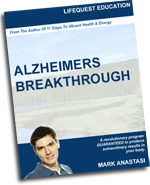 |
|
|
Featured Medical Videos and Health Info > Diseases - Inherited, Environmental or Unknown Causes > Alzheimers Disease - with Audio for the Visually Impaired > Alzheimers and Dementia - Understanding Alzheimers Type Dementia Alzheimers and Dementia - Understanding Alzheimer's Type Dementia
Alzheimers and dementia are strongly linked because Alzheimers disease is the most common type of dementia. Dementia is the constant evolution of the atrophy of the brain's cognitive functions. In the case of Alzheimers, abnormal protein build-up occurs in the brain, which in turn interferes with its normal functions through interactions with the brain nerves and neurotransmitters, causing these elements to whither and die. Memory Loss Is A Common Factor in Both Alzheimer's Disease and DementiaAlzheimers and dementia are attributed with progressive memory loss and other functions that are attributed to brain deterioration. Natural brain atrophy and cognitive function loss is a normal experience by humans as we age. However, Alzheimers type of dementia is way beyond that of what is considered the norm. Alzheimers Type DementiaAlzheimers type dementia is extremely debilitating and the disease can run its course from as fast as 5 years and in some cases, stretch on to 20 years. The disruption caused by Alzheimers type dementia can be very confusing and difficult. What's really hard to accept is that as of the moment, there are no known cures or successful treatments available for Alzheimers patients. Of all the types of dementia, only a very tiny percentage is reversible. Alzheimers is not one of them. Once it attacks, there can be no slowing or stopping it down. All one can do is be prepared for the onslaught. It is important that the patient's friends and loved ones understand Alzheimers and dementia so that they can cope with this situation. If you suffer from the very early stages of Alzheimers type dementia, it can be very difficult for you to accept what is happening to you while you are aware of your situation. Often times, patients can create very difficult situations for themselves as well as for the people around them. For instance, people with Alzheimers type dementia can have the same conversation with the same person over and over again without realizing it. Perhaps a person with Alzheimers type dementia can forget that they have just previously called a loved one to tell them something only to put the phone down and call right back to talk about the exact same thing. Situations like these can cause difficulties that is why it is important for people with Alzheimers type dementia to have the proper care. Loss of correct judgment will inadvertently follow as the Alzheimers type dementia progresses so it might be prudent for patients to be supervised all the time. Eventually, patients will have to depend exclusively on specialized care for all their needs. This makes it important for patients and their loved ones to choose the right facility for this process. It is important that people with Alzheimers type dementia be treated with respect and dignity all throughout the duration of the disease. While the patient has not lost all ability to make judgments and remember important things, they should be consulted in terms of what facilities or type of professional care they think they would benefit from. As a loved one of someone who has Alzheimers type dementia, it can be very hard and painful to witness the progressing of the disease. This may cause some negative emotions and a lot of grief that may be unwittingly projected at the patient. However, at the onset of the disease, when the patient is still conscious and aware, they can go through an even more painful process of accepting their disease. | |||||||
IMPORTANT DISCLAIMER - Many of the articles contained in this site have been reviewed by licensed medical personnel for their medical accuracy. However, the information provided on this site is for informational purposes only and is not intended as a substitute for advice from your physician or doctor or any information contained on or in any product label or packaging. As always, please consult with a licensed doctor or physician before starting any diet, exercise or supplementation program, before taking any medication, or if you have or suspect you might have a problem. Any products reviewed on this site and the claims made about specific vitamins, supplements or other items or procedures on or through this website have not been evaluated by My Medical Learning Center or the United States Food and Drug Administration and are not approved to diagnose, treat, cure or prevent disease. Please visit our policies page for further information. | |||||||
Health News Updated Daily | Links - Submit URL | Terms, Conditions, Policies | Shipping and Refunds Affiliate Agreement
c/o LegalTech, Post Office Box 1945, Show Low, Arizona 85902 (866-794-9273)

